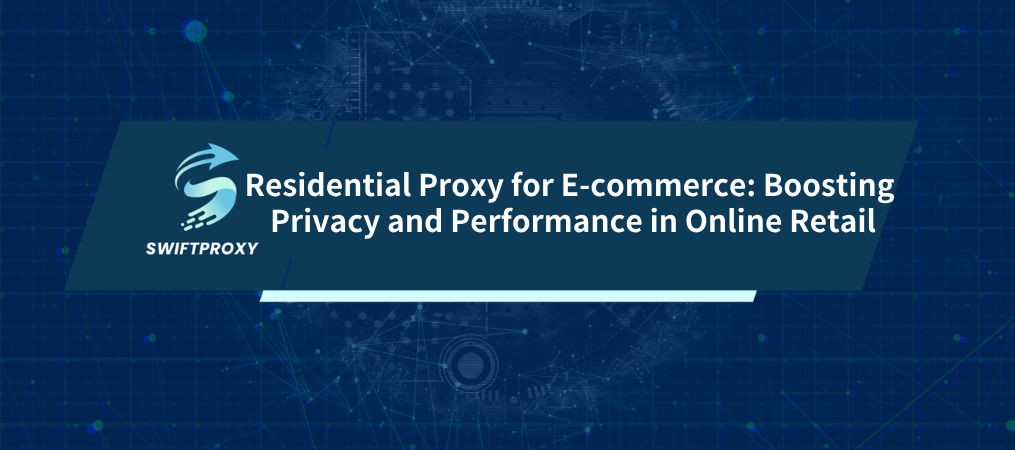Residential Proxy for E-commerce: Boosting Privacy and Performance in Online Retail

In the fast-paced world of e-commerce, businesses are constantly seeking innovative tools to enhance their online presence, optimize operations, and protect user data. One such tool that has gained significant traction is the residential proxy. This article explores how residential proxies are being utilized in the e-commerce industry to improve privacy, security, and operational efficiency.
What is a Residential Proxy?
A residential proxy is a type of proxy server that routes internet traffic through an IP address assigned to a residential internet connection. Unlike data center proxies, which are hosted in commercial data centers, residential proxies leverage real-world IP addresses from residential networks. This makes them appear as legitimate traffic, reducing the risk of being flagged by websites or services as suspicious.
The Role of Residential Proxies in E-commerce
E-commerce businesses deal with vast amounts of sensitive data, including customer information, transaction records, and market trends. Protecting this data while optimizing online operations is crucial. Residential proxies play a pivotal role in achieving these goals.
1. Data Scraping and Market Research
Residential proxies are widely used for web scraping in the e-commerce industry. By rotating IP addresses, businesses can collect large volumes of data from competitor websites, price comparison platforms, and social media without being blocked. This data is then used for market analysis, pricing optimization, and identifying trends.
2. Ad Campaign Optimization
E-commerce platforms rely heavily on targeted advertising to drive sales. Residential proxies help businesses test and optimize their ad campaigns by simulating real user traffic. By masking their IP addresses, advertisers can avoid detection and ensure accurate performance metrics.
3. Preventing IP Bans and Restrictions
Frequent access to e-commerce platforms, especially for scraping or testing purposes, can lead to IP bans or restrictions. Residential proxies allow businesses to rotate IP addresses, bypassing these restrictions and ensuring uninterrupted access to critical tools and services.
4. Enhancing Customer Privacy
E-commerce customers increasingly demand greater control over their personal data. Residential proxies help businesses anonymize user traffic, reducing the risk of data breaches and unauthorized access. This builds trust and fosters long-term customer relationships.
5. Improving Server Performance
By routing traffic through residential proxies, e-commerce businesses can reduce the load on their servers and improve website performance. This is particularly beneficial during peak shopping seasons or high-traffic events like Black Friday or Cyber Monday.
Benefits of Using Residential Proxies for E-commerce
- Unparalleled Privacy: Residential proxies provide a high level of anonymity, ensuring that customer data and business operations remain secure.
- Improved Security: By hiding your IP address, you reduce the risk of cyberattacks and data breaches.
- Global Accessibility: Residential proxies allow businesses to access e-commerce platforms and services from anywhere in the world, bypassing geographical restrictions.
- Cost-Effective: Compared to other privacy tools, residential proxies are often more affordable and easier to set up.
Challenges and Considerations
While residential proxies offer numerous benefits, there are also some challenges to consider:
- Configuration Complexity: Setting up and managing residential proxies can be technically challenging for inexperienced users.
- Cost: High-quality residential proxies can be expensive, especially for large-scale operations.
- Regulatory Compliance: In some jurisdictions, the use of proxies for e-commerce activities may raise regulatory concerns.
Choosing the Right Residential Proxy Service
When selecting a residential proxy service for e-commerce, consider the following factors:
- IP Pool Size: A larger IP pool ensures better anonymity and reduces the risk of IP bans.
- Speed and Reliability: Look for a service with fast and stable connections to ensure seamless e-commerce operations.
- Customer Support: Choose a provider with responsive customer support to assist with any issues that may arise.
- Compliance and Privacy Policies: Ensure the service complies with relevant regulations and prioritizes user privacy.
The Future of Residential Proxies in E-commerce
As e-commerce continues to grow, the demand for advanced privacy and security tools like residential proxies is likely to increase. With the rise of artificial intelligence (AI) and machine learning (ML), residential proxies could become even more sophisticated, offering smarter IP rotation and better protection against cyber threats.
Moreover, the integration of residential proxies with e-commerce platforms could lead to more personalized shopping experiences, while still maintaining user privacy.
Conclusion
Residential proxies are an invaluable tool for e-commerce businesses looking to enhance their privacy, security, and operational efficiency. By masking IP addresses, preventing tracking, and avoiding bans, residential proxies empower businesses to thrive in the competitive online retail landscape.
If you're serious about protecting your e-commerce operations and customer data, it’s time to consider integrating a residential proxy into your strategy. With the right service, you can enjoy peace of mind knowing that your business is secure and compliant.

















































